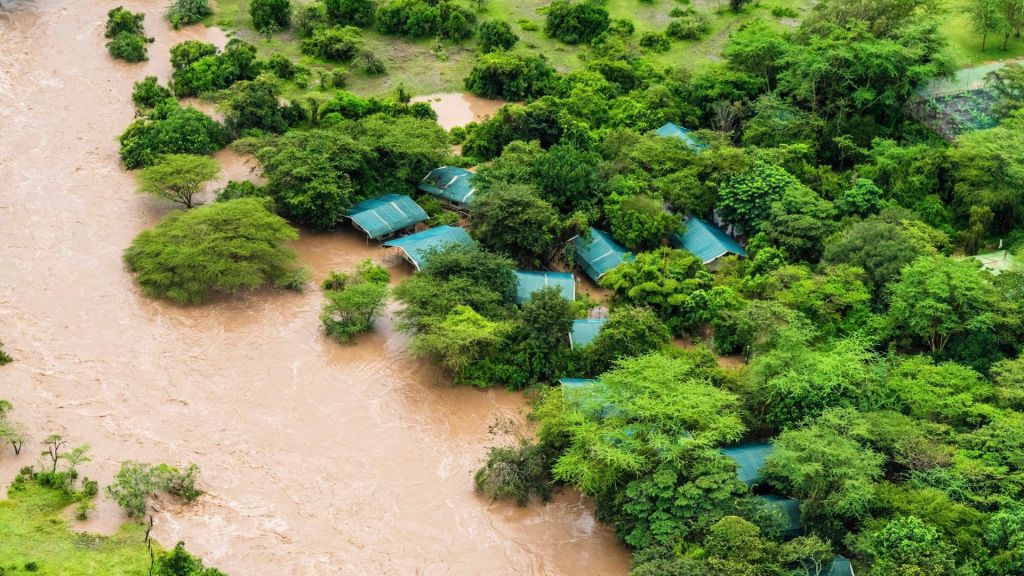By: DaQuan Lawrence
AFRO International Writer
DLawrence@afro.com
The growing impact of climate change becomes more relevant throughout the 21st century as the global phenomenon has recently caused some of the hottest days on record. As modern society has recently experienced sweltering summer temperatures as well as frigid winter days, climate change naturally affects regions around the world differently.

photo: AP Photo/Bobby Neptune
In September 2023, the World Meteorological Organization (WMO) reported that Africa and its populations disproportionately suffer from the effects of climate change although the continent is responsible for only a fraction of global greenhouse gas emissions.
WMO’s “The State of the Climate in Africa 2022” reports that about 110 million people were directly affected by climate, weather and water-related dangers in 2022, and the rate of temperature increase in Africa has accelerated in recent decades, with climate-related and weather-related hazards becoming more severe.
The WMO said there were a reported 5,000 fatalities associated with drought and flooding, according to its Emergency Event Database. Exacerbating the climate situation is the fact that nearly 282 million people across the continent, or almost 20 percent of the population, suffer from food insecurity and are undernourished according to the Brookings Institution.
In a November 2023 expert group meeting in Accra, Ghana, Ngone Diop, the director of the United Nations (UN) Economic Commission for Africa office for West Africa mentioned the significance of food insecurity in West Africa.
“Food insecurity is unfortunately a structural challenge in Africa, affecting 20 percent of the continent’s population compared to the global rate of 9.8 percent…,” said Diop.
During the UN expert convening, specialists claimed that 17 out of the 20 countries most threatened by climate change are in Africa according to the UN Economic Commission for Africa.
The African continent has endured several heatwaves including a February 2024 hot spell that occurred during the Africa Cup of Nations soccer tournament that took place in the Ivory Coast and caused players to take extra hydration breaks during games.
According to the Intergovernmental Panel on Climate Change, over the previous 60 years, Africa has recorded a more rapid warming trend than the global average. As a result of the unpredictable effects of global warming, social justice and environmental justice activists across the African continent have raised concerns about the importance of climate change and its unique implications on African societies.
Throughout the early 2020s, the world has experienced increasing temperatures as the latest data suggests that 2024 could beat 2023 as the hottest year on record.
“I now estimate that there is an approximately 95 percent chance that 2024 beats 2023 to be the warmest year since global surface temperature records began in the mid-1800s,” Zeke Hausfather, a research scientist at U.S. non-profit Berkeley Earth, told Reuters.
In Africa, like much of the Global South, the climate crisis has caused agricultural challenges, food insecurity, droughts and environmental disasters such as storms and floods. With a continent that has distinct landscapes such as savannas, deserts and rainforests, the climate of the region can cause natural occurrences like rain to lead to calamity.
For example, in late April, intense and ceaseless rainfall during Kenya’s “long rains” season (March to May) led to 91 missing persons incidents, 169 deaths and the displacement of more than 190,000 people as reported by Carlos Mureithi of the Associated Press.
Although many people have connected the floods to the natural El Nino weather pattern, Joyce Kimutai, research associate at Imperial College London, said research shows the climate event has little influence on rainfall over East Africa during the “long rains” season. Furthermore, scientists also found that human-caused climate change intensified the rains during the East African rain season.
Whereas Northern and Western Africa are known for the continent’s great Sahara desert, World Weather Attribution (WWA) recently noted that the heatwave and extremely high temperatures across the region were caused by human activities such as deforestation and fossil fuels.
In Western African nations such as Chad, Burkina Faso, Mali and Niger, people experienced temperatures higher than 110 degrees Fahrenheit. In early April, the Malian city of Kayes had temperatures that reached 119 degrees Fahrenheit (48.5 Celsius).
During this time period, Mali’s capital city, Bamako, recorded 102 heat-related deaths, with more than half the deceased being people above age 60. While populations throughout Burkina Faso and Mali are accustomed to high temperatures, the span and severity of the heatwave made it difficult for people to cope according to WWA.
The post Climate change spurs food insecurity, heatwaves and natural calamities in Africa appeared first on AFRO American Newspapers.











